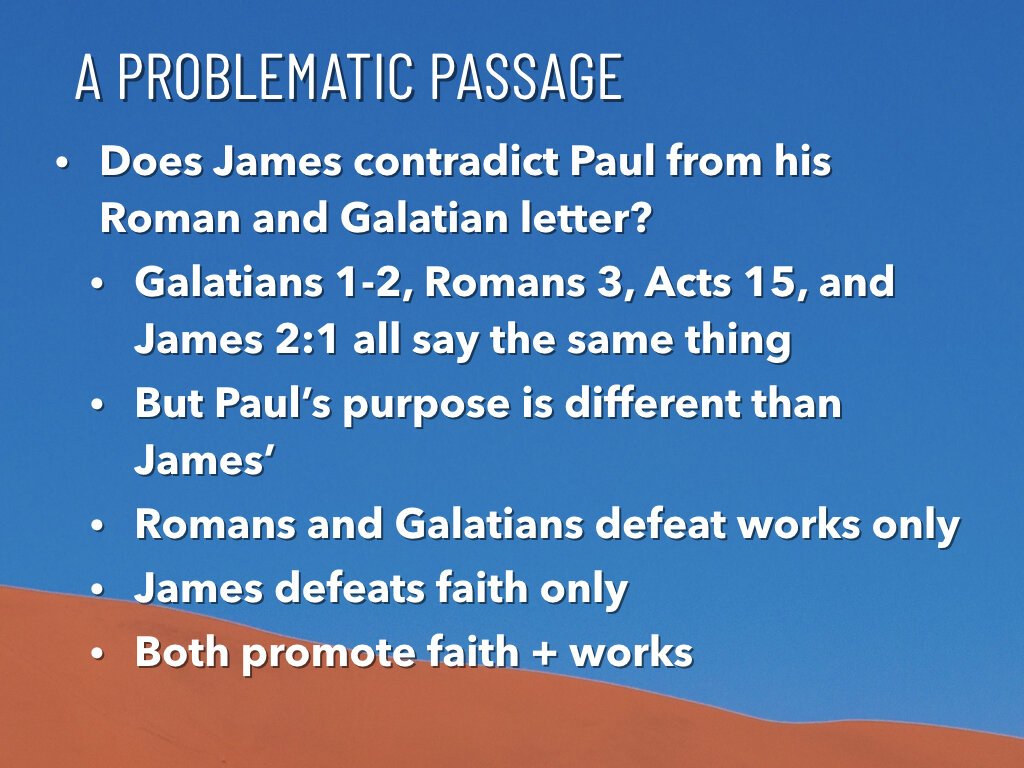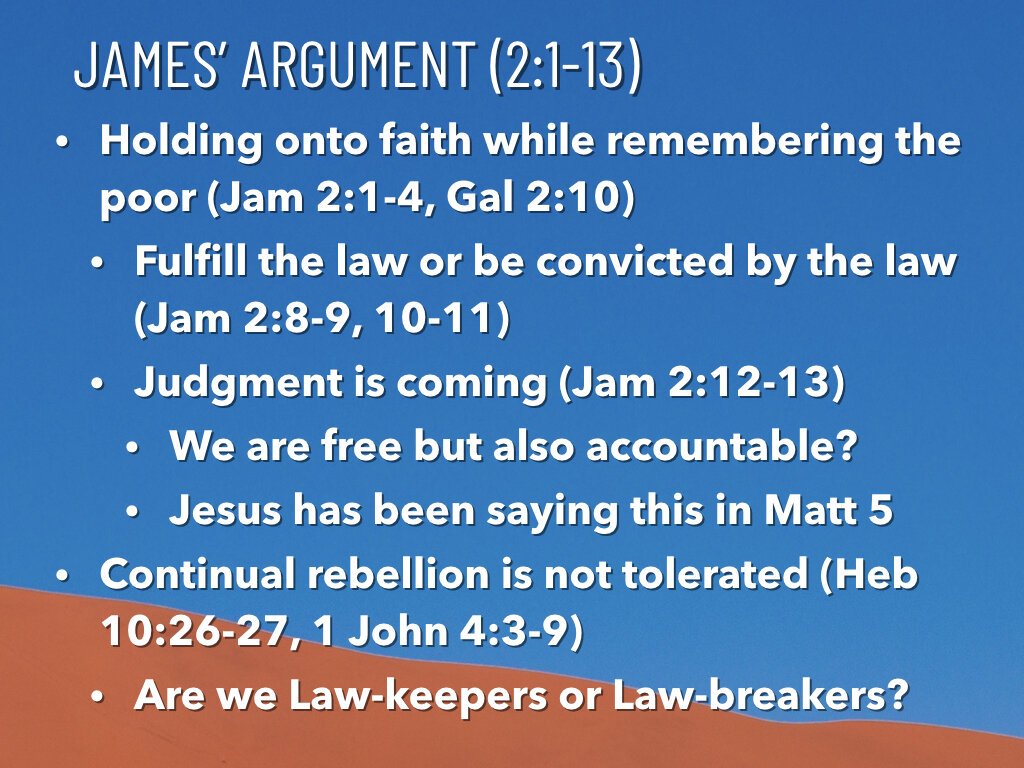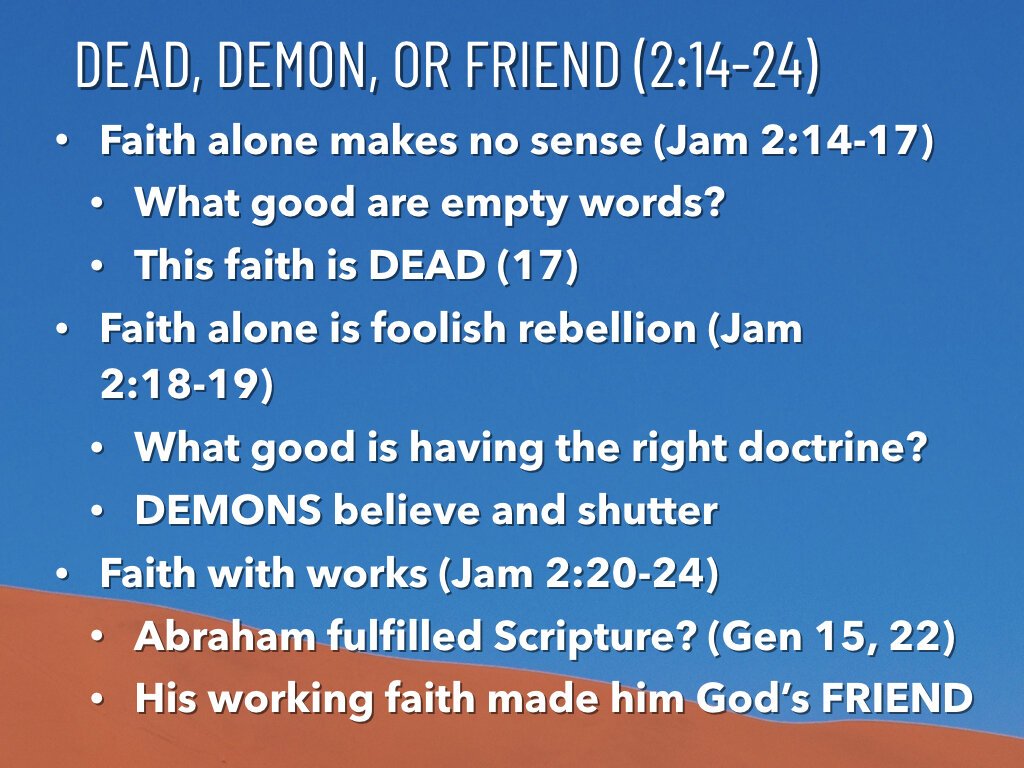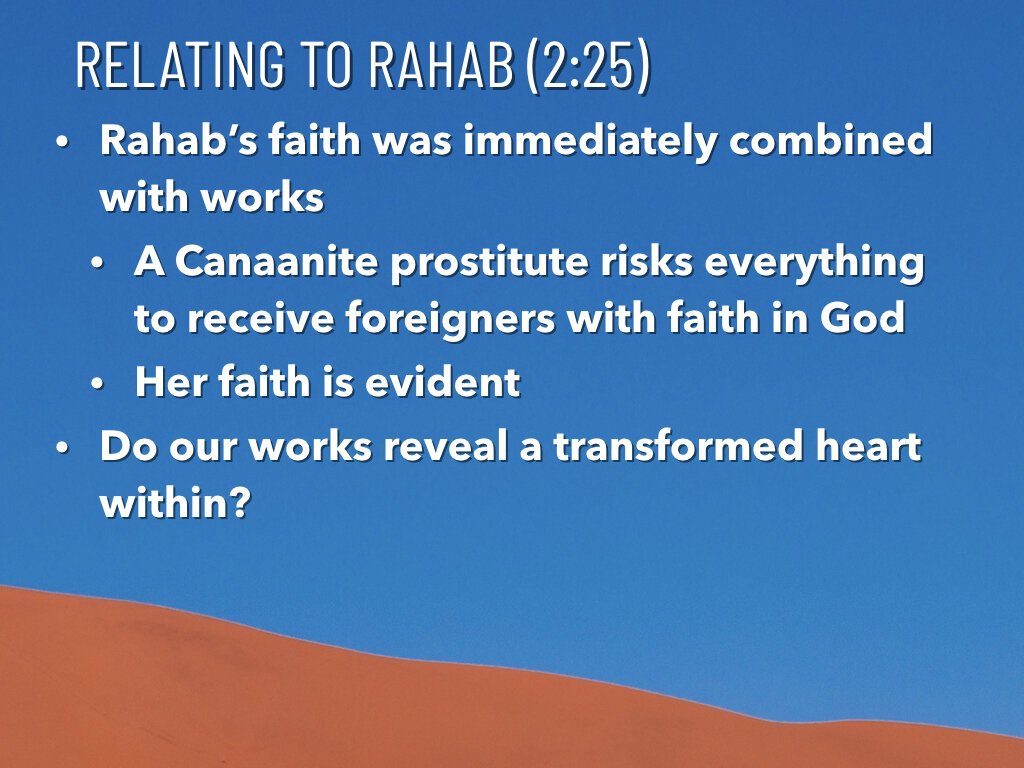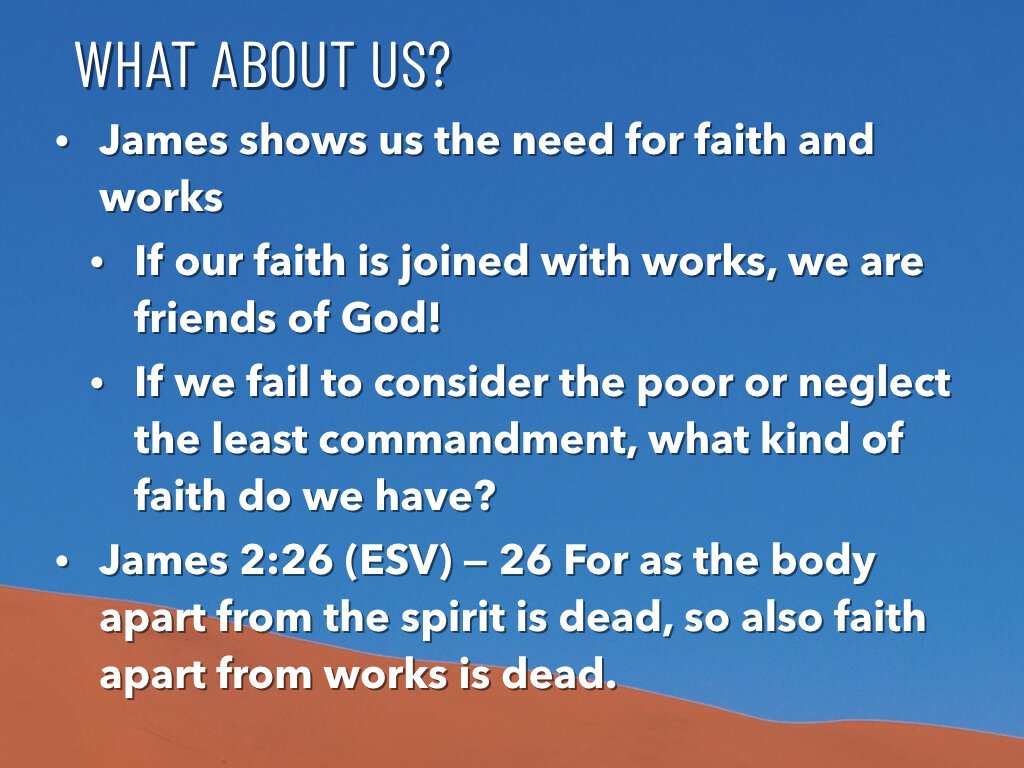What Kind of Faith? (James 2)
January 5, 2020
People have faith in many different things. Some have faith in this earth, people, Allah, Buddha, and those of us gathered together have faith in the God of the Bible. But what kind of faith do we have? Did you know there are different kinds of faith? I'm sure we all can see different types of faith as we look at people who call themselves Christians. We may not be able to put our finger on the difference by we know that it is there. James helps us with this.
I would like for us to develop an understanding of faith as we study James 2. James is a letter that many Christians struggle with because James seems to contradict Paul. In Romans, Paul is trying to help them understand what living by faith is all about. But the purpose of James' letter is to reveal the fake Christianity that has developed through the gospel. He wants to warn Christians against this fake Christianity.
Don't Continue To Sin
When we look at James 2 we see this very clearly.
James 2:1--4 (ESV) --- 1 My brothers, show no partiality as you hold the faith in our Lord Jesus Christ, the Lord of glory. 2 For if a man wearing a gold ring and fine clothing comes into your assembly, and a poor man in shabby clothing also comes in, 3 and if you pay attention to the one who wears the fine clothing and say, "You sit here in a good place," while you say to the poor man, "You stand over there," or, "Sit down at my feet," 4 have you not then made distinctions among yourselves and become judges with evil thoughts?
James commands those who are holding to their faith in the Lord Jesus Christ, the Lord of glory, to avoid showing partiality. Then, he tells them how they are showing partiality. These are Christians who believe God's grace saves them through their faith in Jesus Christ. They are holding onto that belief.
But James says they must not now show partiality. Why not? Listen to this.
James 2:8--9 (ESV) --- 8 If you really fulfill the royal law according to the Scripture, "You shall love your neighbor as yourself," you are doing well. 9 But if you show partiality, you are committing sin and are convicted by the law as transgressors.
Wait a second, James. Are you trying to say that those who hold to faith in Jesus are going to be judged according to the law?
James 2:10--11 (ESV) --- 10 For whoever keeps the whole law but fails in one point has become guilty of all of it. 11 For he who said, "Do not commit adultery," also said, "Do not murder." If you do not commit adultery but do murder, you have become a transgressor of the law.
Like many places in this letter, this is intended to shock the reader. Everyone reading this letter knows that God's grace saves us and that we are not under the law. James knows that according to Acts 15, but also according to verse 1 of this Chapter! So why does he say that those who show partiality will be convicted as a breaker of the law?
James 2:12--13 (ESV) --- 12 So speak and so act as those who are to be judged under the law of liberty. 13 For judgment is without mercy to one who has shown no mercy. Mercy triumphs over judgment.
Here is the reason why. God will withhold his forgiveness from those who refuse to submit to his will. Don't be fooled by the fact that this is a law of liberty. There will still be judgment for those who continue to rebel. Being partial toward the rich and mistreating the poor breaks the second greatest commandment. God will judge those who are rebelling against his will and refusing to repent.
This is the same thing that Jesus has been saying in the Sermon on the Mount. He says that those in his kingdom must fulfill the law to a greater extent than the scribes and Pharisees. Verse 8, alludes to the fact that we are supposed to keep the law. Paul even says it in Romans 3:31, 6:1-2, 15-18. We are forgiven by grace through faith in Christ. That is supposed to transform us into law-keepers instead of lawbreakers. If we rebel against the law, being evil toward our brother, we will be judged without mercy. The Hebrew writer also says, "If we deliberately keep on sinning after we have received the knowledge of the truth, no sacrifice for sins is left, but only a fearful expectation of judgment and of raging fire that will consume the enemies of God." (Heb 10:26-27, 1 John 4:3-9)
Dead Faith
This does not sound good. Many Christians were hoping to just hold on to faith, ride that wave all the way into heaven, while they live the way they want, and don't change their lives. In the next section, James explains why Christians cannot keep rebelling in this way and be saved. He helps us understand the problem.
James 2:14--17 (ESV) --- 14 What good is it, my brothers, if someone says he has faith but does not have works? Can that faith save him? 15 If a brother or sister is poorly clothed and lacking in daily food, 16 and one of you says to them, "Go in peace, be warmed and filled," without giving them the things needed for the body, what good is that? 17 So also faith by itself, if it does not have works, is dead.
Having faith without having works is like telling someone who is starving to stop being hungry or anxious about food. We might as well tell them to win a million dollars. It does them no good. We can believe something will happen with all our hearts, but if we aren't willing to lift a finger to make it happen, we don't really want it to happen. We are deceiving ourselves (1:22). If I really wanted the poor, needy person to be warm and filled, I would give them something to wear and something to eat. If I truly loved them, I wouldn't hesitate.
Demon Faith
Not only is faith without works no good, but it also makes us resemble something else.
James 2:18--19 (ESV) --- 18 But someone will say, "You have faith and I have works." Show me your faith apart from your works, and I will show you my faith by my works. 19 You believe that God is one; you do well. Even the demons believe---and shudder!
Do you see what James does here? First, he is making fun of those who separate faith and works. Someone will say, "You have faith and I have works." Who would say such a thing? That is totally ridiculous. He responds to that foolish statement by saying that faith without works is not able to be proven. The person who says they have faith and does not have works clearly does not have faith. They don't understand that faith is more than belief.
Then, he points to those who have a correct theology. They believe that God is one. They have the right doctrine, and that is great! They are doing so well by believing the right things. But James says, "Even the demons believe --- and shudder!" If we think that believing the right things will make us righteous enough to get into heaven, we are dead wrong!
Don't misunderstand what I'm saying here. The church is the pillar and ground of the truth, but that is not all the Bible says about us. We are also a kingdom of priests. We are supposed to be living lives that are holy and righteous, fulfilling the law by loving God more than anything else and loving our neighbor as ourselves. Believing the right things is not an indication that we have faith. There must be more because demons know what the truth is, and they don't do anything to glorify God. They do not keep the law. We resemble them. Is that shocking to us? How easy would it be to proclaim ourselves as the "guardians of truth" while living lives that rebel against the truth? We might think this is ridiculous, but how many sermons are preached against idolatry, partiality, anger, and heart issues that are just as important as murder and adultery. This faith that knows the truth and does not obey it is not what God is looking for, and it will not save us.
James even says that the demons are terrified of God while they always rebel. Why would anyone do that? Do we obey the gospel, read our Bible, and go to church to keep from going to hell while treasuring idols in our hearts and being evil toward our brother.
A Friend of God
God does not want a dead faith that shows no love to the poor or a demon faith that believes all the right things, yet rebels against God. God wants a living and active faith that loves God and our neighbor. This brings us to the last point.
James 2:20--25 (ESV) --- 20 Do you want to be shown, you foolish person, that faith apart from works is useless? 21 Was not Abraham our father justified by works when he offered up his son Isaac on the altar? 22 You see that faith was active along with his works, and faith was completed by his works; 23 and the Scripture was fulfilled that says, "Abraham believed God, and it was counted to him as righteousness"---and he was called a friend of God. 24 You see that a person is justified by works and not by faith alone. 25 And in the same way was not also Rahab the prostitute justified by works when she received the messengers and sent them out by another way?
Dead faith is worthless. A faith that hears the truth believes it and does not do it is rebellious. So what does a real faith look like? We need tangible examples to understand. James gives us two examples. The first is an example of Abraham, who fulfills the first commandment to love God with all of his heart, soul, mind, and strength. Abraham was "justified by works when he offered up his son Isaac on the altar." James says, "Faith was active along with his works, and faith was completed by his works." The terminology here is essential. Was Abraham justified by works alone or by faith alone? No, he was justified by a working faith. His faith was not dead. He did not just state that he believed God and then live a life totally rebellious against that belief.
There is something especially amazing about verse 23. James says that Abraham offering up his son Isaac in Genesis 22 was the fulfillment of Scripture. Did you know that? Back in Genesis 15, Abraham doubted God's promise, so God took him outside and showed him the stars in the sky. He told him, "Look toward heaven, and number the stars, if you are able to number them... So shall your offspring be." (Gen 15:5). Abraham believed God, and the text says, "He counted it to him as righteousness." From the outside looking in that is ridiculous. You shouldn't count that belief as righteousness. But God knew that Abraham's faith wasn't dead or like the demons. So he called Abraham righteous, and when the time came for Abraham's faith to be tested, God was right in calling him righteous. I don't imagine anyone could have loved their child like Abraham loved Isaac, but as he offered his son, he proved that he loved God more than Isaac. Abraham fulfilled the greatest command and fulfilled God's prophesy that his faith was working. God's grace was poured out on Abraham, he received the grace with faith, and he was transformed to have a heart that trusted in the Lord and loved him.
The last words are amazing. This trust and love for God make Abraham a friend of God. He is not dead or a demon. He is a friend. What a statement!
A Friend of Man
The second example in that text is Rahab. This example shows us the love we must have toward our neighbor. Rahab is a Canaanite prostitute who accepted strangers into her home to save them from being captured in Jericho. She believed that the God of Israel was able to destroy Jericho, and she believed that he was gracious enough to save her from the destruction. So what did Rahab do? She acted on her faith. She did not open the door, say, "Don't get caught," and leave them out in the open. She helped them at great risk to her own life and the lives of her family. Receiving people and helping them exemplifies the faith that fake Christians are missing. The Canaanite prostitute is making us look bad!
What Kind of Faith Do We Have?
All of this is intended to make us evaluate our faith. James wants us to think more deeply about our current situation. We need to see whether we are fake Christians with dead faith that looks like demons, or friends of God. If we are doing the works that accompany a living faith (trusting in God, helping those who are in need, avoiding sinful anger, lust, and idolatry), we should see our fruit and be encouraged to know that we are friends of God. God's grace does set us free from past sins, and we can rest assured that he is compassionate toward us as we strive to do his will.
But if we are coasting through life after believing the truth and showing a complete lack of interest in living for God, we need to understand that there is still judgment ahead. Jesus did not die so that we could enjoy life on our terms. He died so we could find a better life that glorifies God. We do not want judgment without mercy. We want grace. God offers it freely to those who submit their lives to following his will. Is that you?


